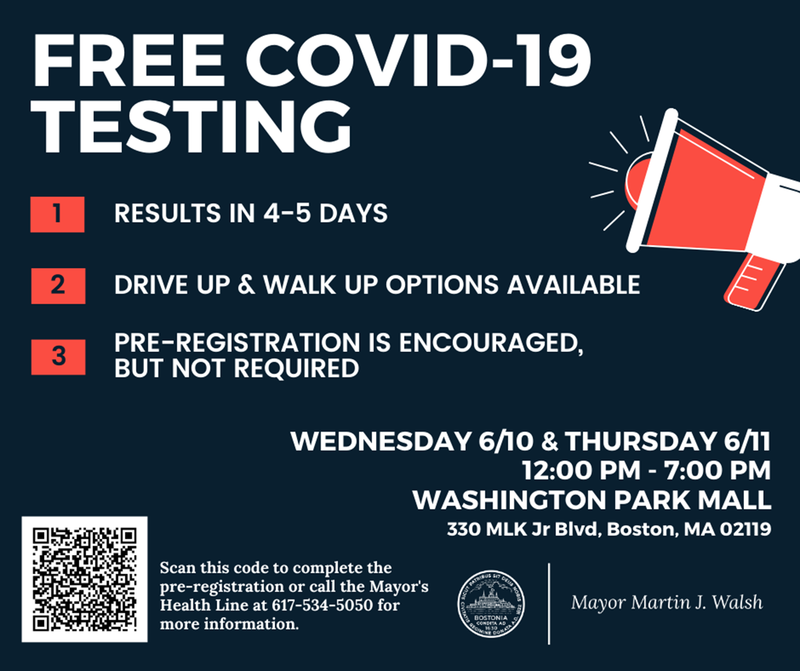New COVID-19 testing pop-up site coming to Roxbury
Residents who have recently participated in large gatherings are encouraged to get tested.
Mayor Martin J. Walsh announced today the City of Boston is partnering with the East Boston Neighborhood Health Center to offer free and confidential COVID-19 testing to symptomatic and asymptomatic individuals in a pop-up location in Roxbury. This community testing initiative will be available tomorrow, Wednesday, June 10, and Thursday, June 11, at Washington Park Mall's parking lot from 12 - 7 p.m., and will be open to everyone on a walk-in or appointment basis. Boston residents who have recently participated in large gatherings are strongly encouraged to get tested to limit the further spread of COVID-19. To avoid waiting in line to register at the site, please complete your pre-registration before arriving by scanning the QR code through the graphic below or calling 617-568-4500. You can also call the Mayor's Health Line at 617-534-5050 for more information.
"As residents take a stand and raise their voices against racism and injustice, we want to provide every tool we can to keep them and their loved ones healthy when returning home," said Mayor Walsh. "In addition to handing out face coverings and hand sanitizer at recent demonstrations, we are proud to now make available a pop-up site for anyone -- with symptoms or not -- and encourage those who have recently been in large groups to get tested and limit the further spread of COVID-19 in our community."
Boston is offering COVID-19 testing in over 20 locations across the city that can be found at boston.gov/covid19-testing-map along with hours and contact information. Mobile testing has been filling gaps in testing availability, prioritizing neighborhoods and populations that need dedicated testing efforts to create equitable access to testing.
As part of the ongoing work to make testing available for groups at risk of faster spread and more severe illness from COVID-19, the City has been universally testing individuals experiencing homelessness and among other high-impact populations and sites, including first responders.
Massachusetts General Hospital (MGH) and the Boston Public Health Commission (BPHC) recently conducted a study to evaluate community exposure to COVID-19 through a representative sampling of asymptomatic Boston residents that resulted in 9.9 percent testing positive for antibodies and 2.6 percent of currently asymptomatic individuals testing positive for COVID-19. In conclusion, approximately 1 in 10 residents in this study have developed antibodies and approximately 1 in 40 currently asymptomatic individuals are positive for COVID-19 and potentially infectious. The City has now expanded antibody testing to more Bostonians including targeted populations, such as first responders and frontline workers.
The City of Boston has been partnering with community health centers to increase access to testing, particularly in neighborhoods experiencing higher rates of COVID-19. As of June 1, 2020, there have been 58,115 COVID-19 tests of Boston residents of which 22.6 percent have tested positive, down from 24.2 percent reported through May 24. The incidence rate of COVID-19 has been higher for Dorchester, East Boston, Hyde Park, Mattapan, Roslindale, Roxbury, and the South End compared with the rest of Boston. Of cases where race/ethnicity was known, 4 percent were Asian, 38 percent were Black, 26 percent were Hispanic or Latino, 25 percent were white, and 7 percent identified as multi-racial or another racial/ethnic group. The latest numbers of cases by Boston neighborhoods are available here.
Mayor Walsh and the Boston Resiliency Fund Steering Committee have dedicated over $1,300,000to expand COVID-19 testing and conduct culturally appropriate outreach and education to community health centers across City of Boston neighborhoods, including Bowdoin Street Community Health Center, Codman Square Community Health Center, The Dimock Center, DotHouse Health, Mattapan Community Health Center, Uphams Corner Community Health Center, Whittier Street Community Health Center, Charles River Community Health, Fenway Health, Greater Roslindale Medical & Dental Center, Harbor Health, East Boston Neighborhood Health Center, Harvard Street Neighborhood Health Center, Southern Jamaica Plain Health Center, South Boston Community Health Center, NEW Health Charlestown, South End Community Health Center, and Brookside Community Health Center. The Fund has also supported telehealth services and equipment at those community health centers as well to connect testing to safe treatment options at home.
Resources and information about COVID-19 are available online. Resources available on boston.gov and through City departments include support for renters and homeowners; small businesses; free meals for Boston students and families; free toiletries for Boston students; emergency childcare centers; support for older residents; information on homeless shelters; transportation options for health care workers; resources for those in recovery or those who have a substance use disorder; and mental health resources. More information on Boston's reopening can be found at boston.gov/reopening.
For additional questions or programs, please visit our coronavirus website or call 3-1-1, Boston's 24-hour constituent hotline. Text BOSCOVID to 888-777 to receive text alerts on a regular basis, available in 11 languages.


